We Dive Into Your Projects
What were the projects or initiatives you worked on? We probe to understand the scope, the stakes, and the significance.
"Tell me about the biggest project you led last year..."8+ Public Relations Resume Examples
In Public Relations, you're competing with 800 applicants per search
You're Not Rejected.
— You're Overlooked —
We fix your public relations resume with one conversation
The strongest public relations resumes lead with communication skills, media relations outcomes, crisis management capability, and measurable campaign results — not client lists or press release counts. Hiring managers at agencies like Edelman, Weber Shandwick, FleishmanHillard, and Ketchum and in-house at major corporations scan for media placements secured, earned media value, sentiment shifts, and proof that your communications work drove measurable business and brand outcomes. Every resume sample on this page was built through a 1-on-1 interview that extracted the specific media relations results and crisis management outcomes that differentiate candidates in a field averaging 800 competitors per job search.
Each public relations resume sample below was written through our 1-on-1 interview process. Click any public relations resume example to see the full sample and learn how we transformed their experience into proof.
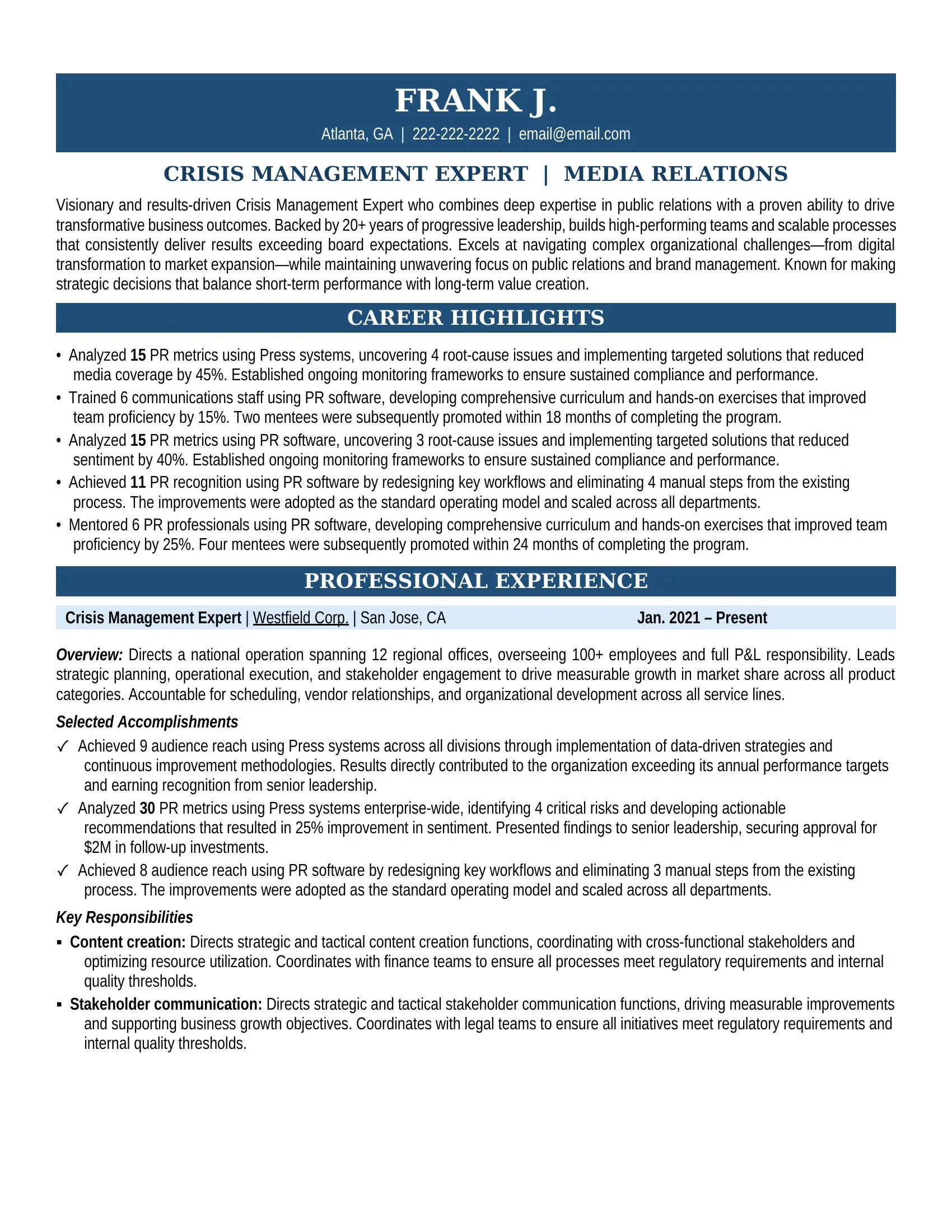
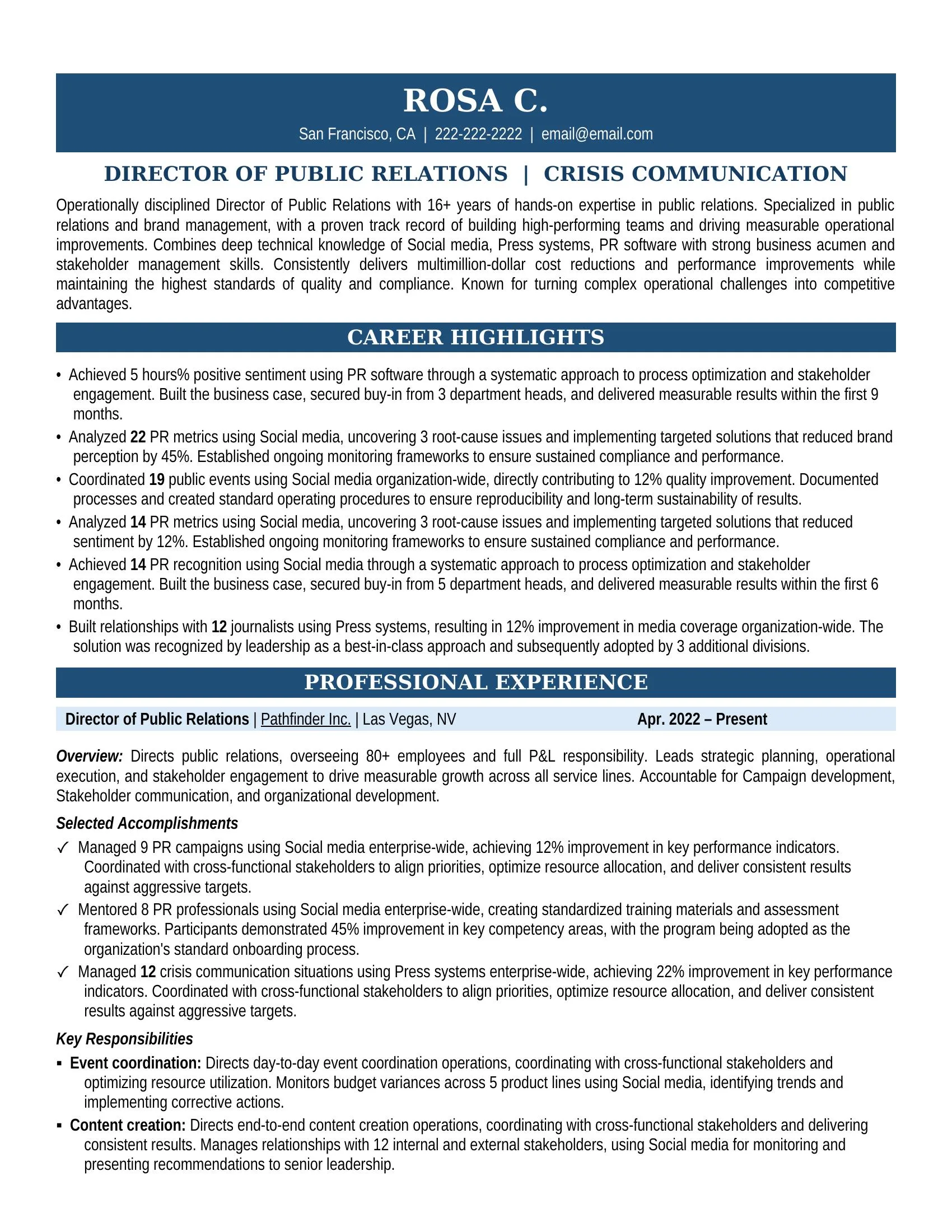
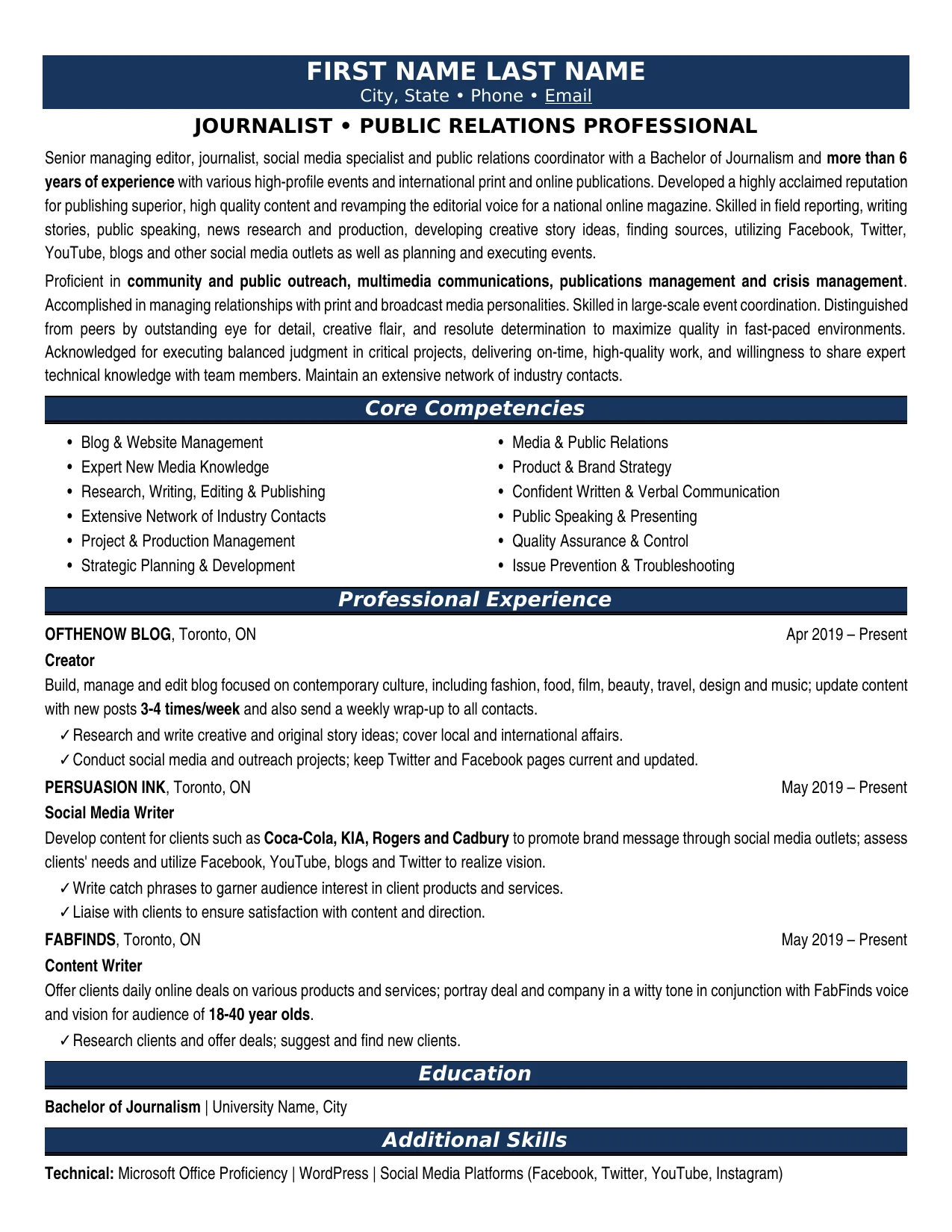
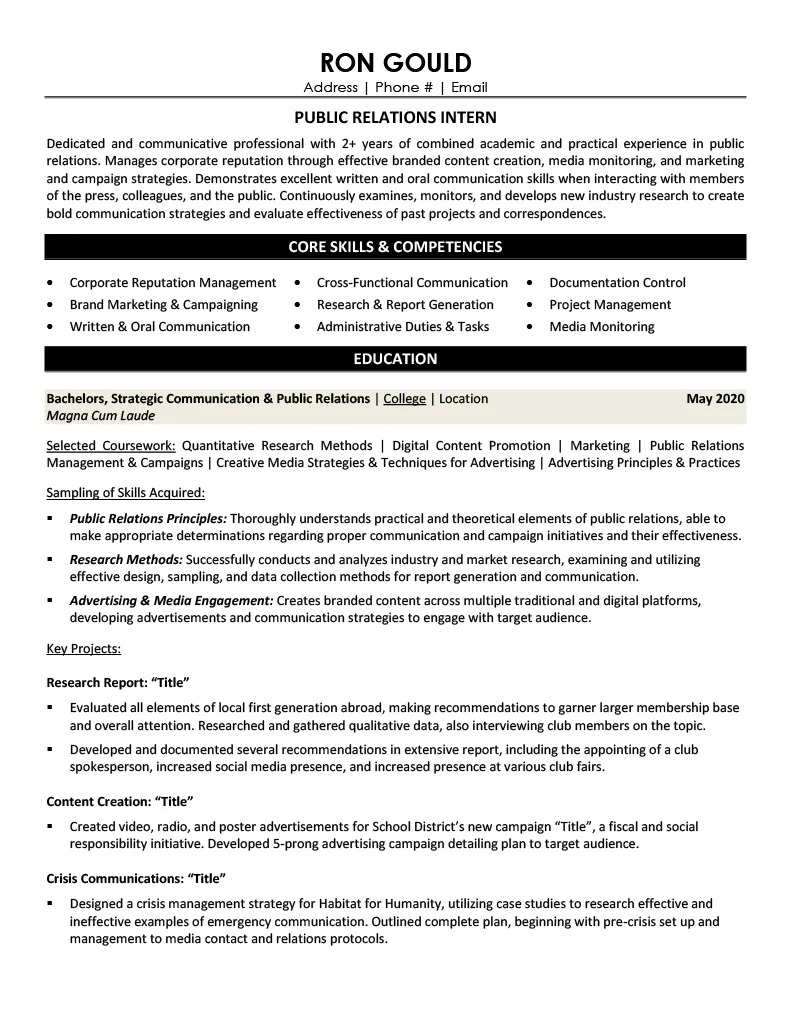
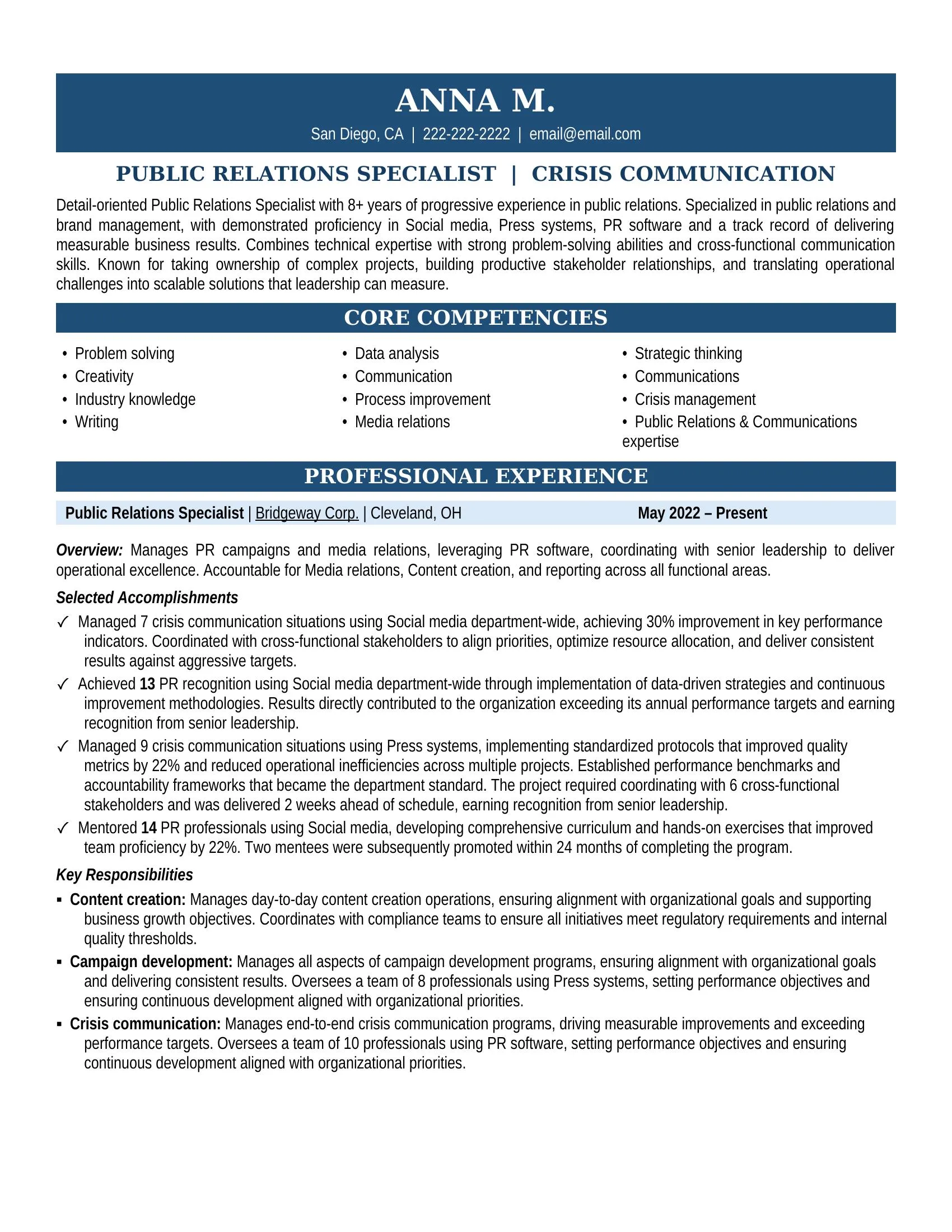
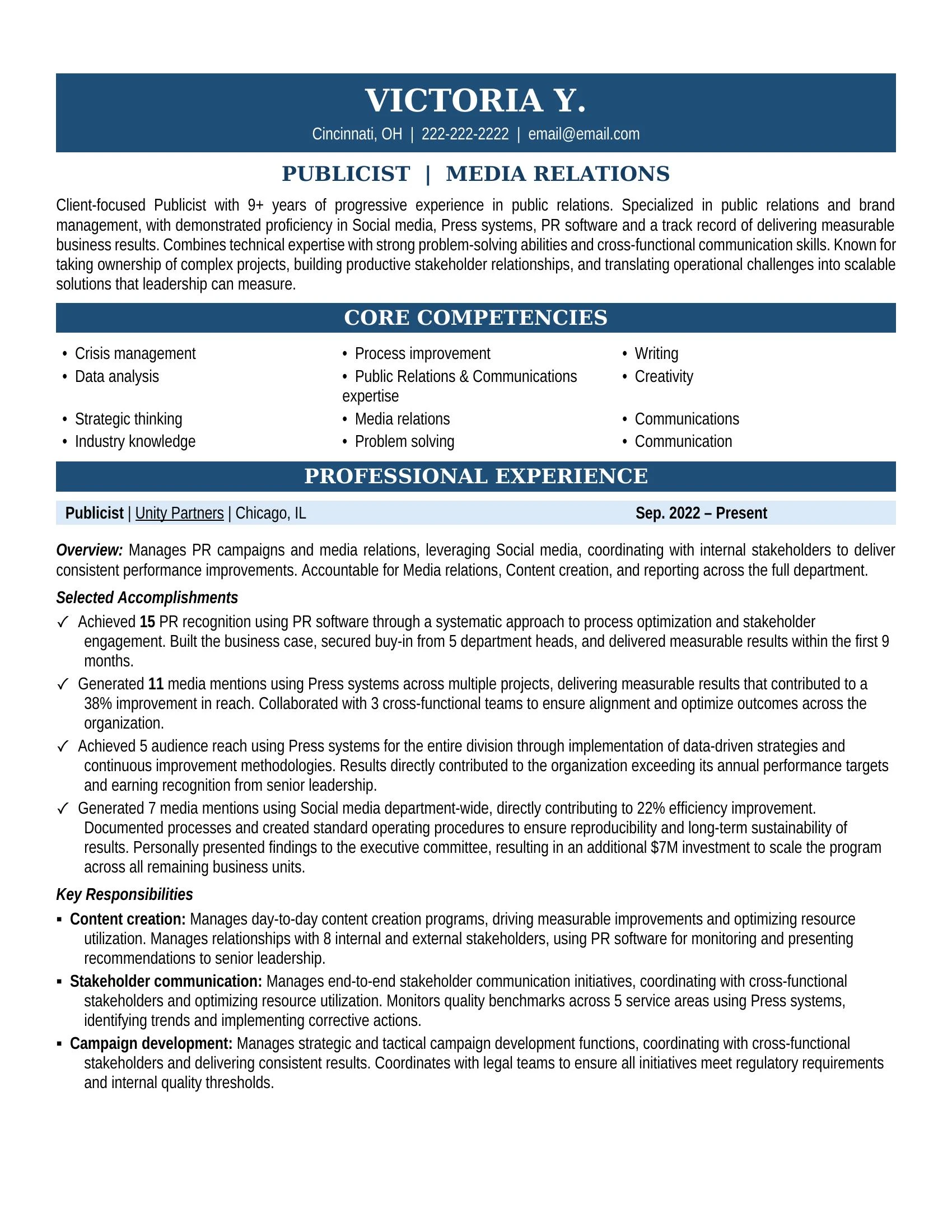
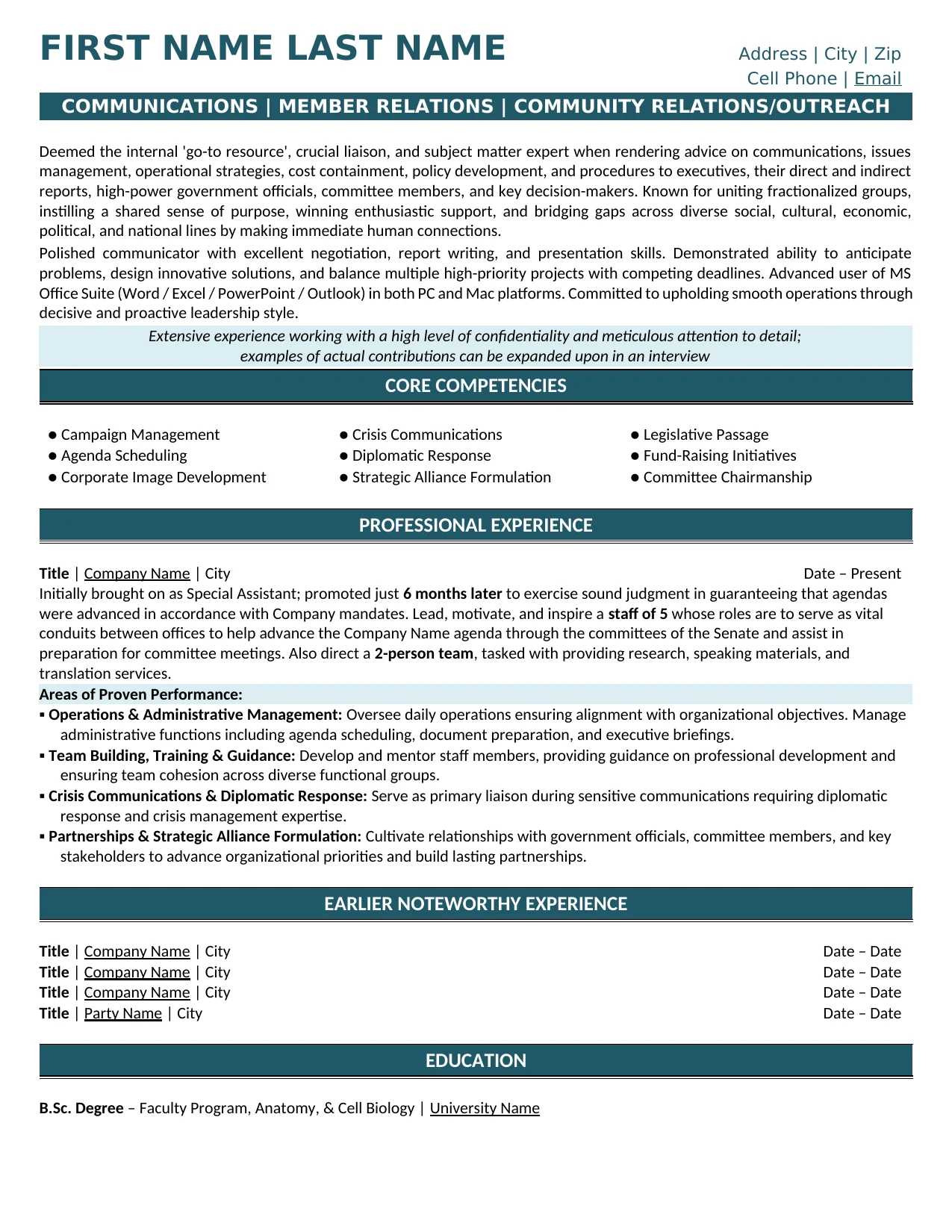
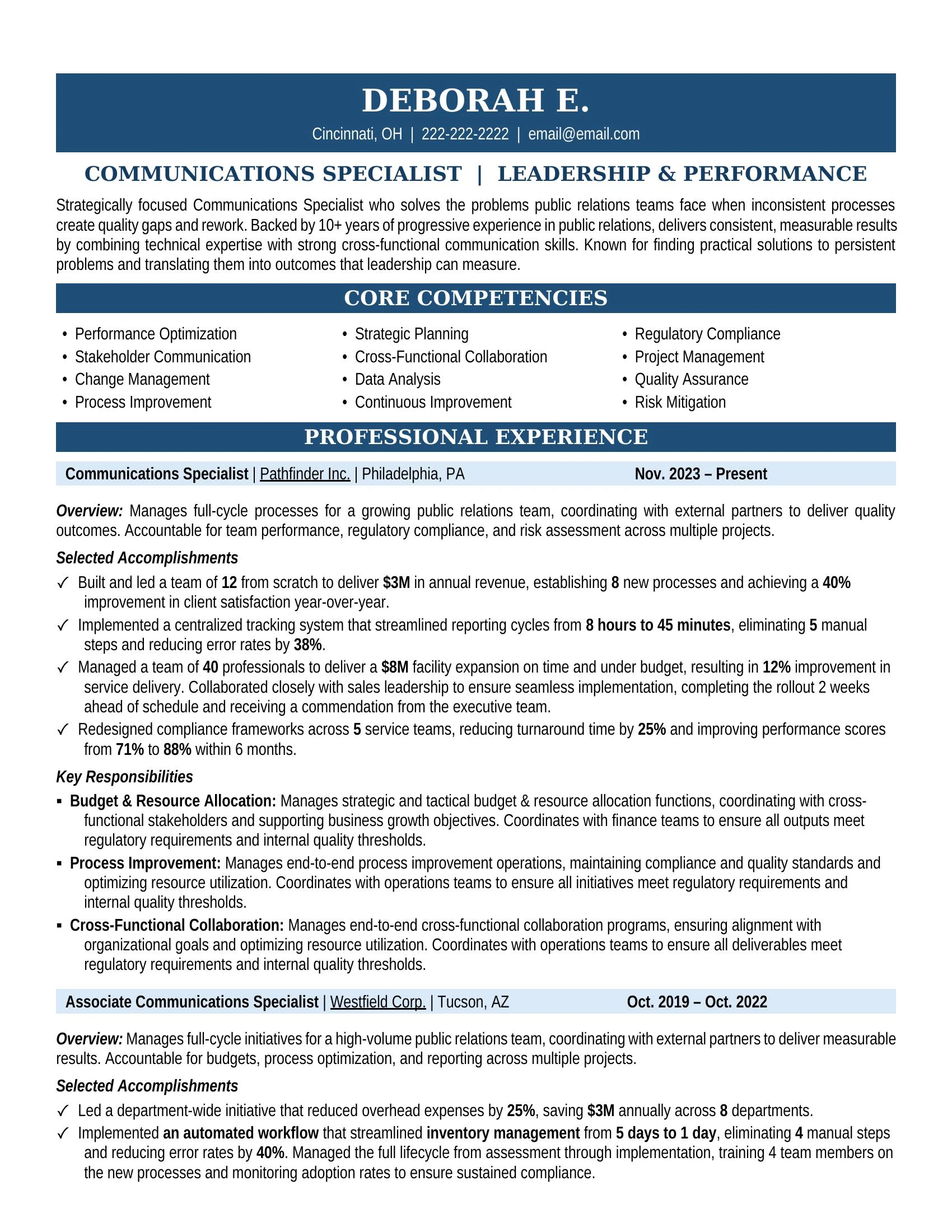
When a hiring manager reads your public relations resume, they should think:
"This person has solved the exact problems we're facing."
What were the projects or initiatives you worked on? We probe to understand the scope, the stakes, and the significance.
"Tell me about the biggest project you led last year..."What were the goals of the project? The company's objectives? We connect your work to business outcomes.
"What was the company trying to achieve with this?"What systems, processes, and strategies did you implement? This is where your expertise becomes visible.
"Walk me through how you actually made this happen..."What challenges did you face? What systems did you implement to overcome obstacles?
"What was the biggest challenge, and how did you solve it?"See how our interview process uncovered achievements and turned them into interview-winning proof.
Get Your Public Relations Resume Written
Public Relations jobs average 40 applicants per position. You're competing against 800 candidates. Our public relations resume examples show how to stand out.
Data based on LinkedIn job postings. Updated Mar 2, 2026.
Here's the math most job seekers don't do:
Your public relations resume must stand out against 800 professionals.
What makes you different is the story behind the projects.
Get Your Public Relations Resume WrittenEvery public relations resume example on this page was written through our 1-on-1 interview process. We extract achievements you'd never think to include.
We identify keywords and achievements that get public relations resumes noticed.
Targeted questions about your public relations projects and results.
Transform responsibilities into quantified achievements.
ATS-optimized resume in 3 business days + 14-day revisions.
80% of public relations positions are never advertised. Get your resume directly into the hands of recruiters filling confidential searches.
When you purchase our Resume Distribution service, your resume goes to 450+ recruiters specializing in public relations — included in Advanced & Ultimate packages.
| Agency | Location |
|---|---|
|
HA
Hays Specialist Recruitment
|
Nationwide |
|
RA
Randstad Staffing Agency
|
Nationwide |
|
KE
Kelly Services Workforce Solutions
|
Nationwide |
|
MA
ManpowerGroup Talent Solutions
|
Nationwide |
|
AD
Adecco HR Services
|
Nationwide |
Public relations averages 40 applicants per position across 5,000 active job postings — and in a field where everyone claims strong communication skills, the differentiator is documented results. Publicist positions are the most competitive at 64 applicants per opening, where employers evaluate communication skills, media relations outcomes, and crisis management capability. Journalist transitioning to PR roles draw 59 applicants — journalism experience is valued but must be reframed around PR outcomes. Director of Public Relations averages 56, PR Specialist sees 51, Crisis Management Expert draws 49, and PR Intern averages 45. Apply to 20 positions in a typical 30-day search and you're one of roughly 800 candidates competing. In PR — where your job is literally crafting compelling narratives — a resume that fails to tell your own story with measurable impact is a disqualifying irony.
Because PR achievements are media placements, crisis outcomes, and brand impact metrics that questionnaires never capture. A Publicist who writes "managed media relations" could describe anyone with a media list and a Cision login. Our interview process extracts the communication skills, media relations outcomes, and crisis management capability that prove you deliver results — in a 64-applicant field. A PR Director who claims "oversaw communications function" becomes someone with documented communication impact, media relations outcomes, and crisis management results — at 56 applicants per opening. A Crisis Management Expert who "handled crisis communications" becomes someone with quantified response times, sentiment recovery, and brand protection outcomes — at 49 applicants. A PR Specialist who "wrote press releases and pitched media" becomes someone with measurable placement rates, impression counts, and earned media value — at 51 applicants. A questionnaire reduces all of them to "PR professional with strong communication skills." The interview captures the placements secured, the crises managed, and the brands elevated.
They're screening for communication impact and media outcomes — not press release volume or media list size. For Publicists: communication skills, media relations outcomes, and crisis management capability — at 64 applicants, every competitor brings media experience but few document the earned media value or impression impact. For PR Directors: communication skills, media relations, and crisis management at the strategic level — at 56 applicants where leadership of communications departments requires proven outcomes. For Journalists transitioning to PR: communication skills reframed as media relations capability — at 59 applicants where storytelling ability must translate to client and brand outcomes. For PR Specialists: communication skills, media relations, and crisis management foundational capability — at 51 applicants. For Crisis Management Experts: response speed, sentiment recovery, stakeholder management, and brand protection outcomes — at 49 applicants. ATS systems at agencies like Edelman and Weber Shandwick and in-house at major corporations keyword-scan for media relations, crisis communications, earned media, content strategy, social media management, Cision/Meltwater, and specific industry verticals before a hiring manager reviews your resume.
It matters fundamentally — these are different PR functions evaluated by completely different criteria. Agency PR (Publicists, Account roles) proves client service capability through communication skills, media relations, and crisis management across multiple accounts — Publicist draws 64 applicants where billable impact and client retention matter. Corporate communications (Directors, in-house) proves organizational leadership through strategic communication outcomes, executive visibility, and internal/external messaging alignment — Director PR draws 56 applicants. Crisis management proves pressure-tested capability through response speed, sentiment recovery, and brand protection — Crisis Management Expert draws 49 applicants where proven crisis outcomes are the ultimate differentiator. Media relations proves outreach capability through placement quality, outlet tier, earned media value, and journalist relationships — PR Specialist draws 51 applicants. Journalism-to-PR transition requires reframing storytelling expertise as media relations and communications capability — at 59 applicants where editorial credibility becomes a PR asset. During your interview, our writers identify your PR track and extract the media outcomes, crisis results, and communications impact that agencies and corporate teams evaluate.
Our public relations resume packages are based on career level and interview depth — from a 30-minute early career session to a 90-minute CCO/executive interview. When evaluating price, consider what the number actually buys. A company charging $99: after the company takes its margin, the writer earns $40-60 — enough for about 45 minutes of total work including writing. That's a questionnaire reformat that produces "PR professional with strong communication skills and media relations experience." Our Professional-level interview alone is 60 minutes, followed by job posting analysis, drafting, and revisions — producing quantified media placement outcomes, crisis management results, and earned media value that prove impact in a field averaging 40 applicants per position. View current packages and pricing.
We offer a 90-Day Interview Guarantee. If you don't land interviews within 90 days of receiving your final public relations resume, we rewrite it free of charge. We can make this guarantee because our interview-based process produces resumes built on the media outcomes, crisis management results, and brand impact that PR employers respond to. Browse the resume samples on this page to see the quality of work we deliver.